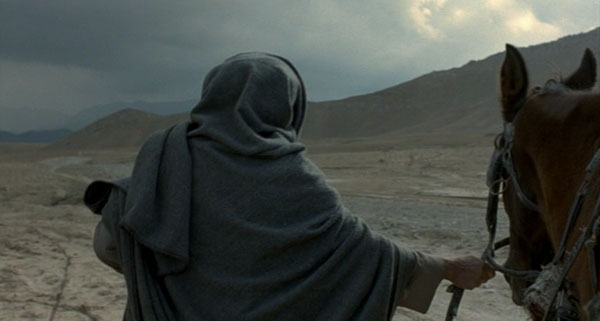I’ve watched this before, and both times I knew the general idea (documentary footage is being faked, people involved in real events are restaging them for the camera), but I was noticing this time how in some movies Kiarostami never tips his metafictional hand. We know from interviews and DVD extras that the movie theater (and the movie) never existed in Shirin, that the drivers and riders of Ten were never in the car at the same time, and that everyone in Close-Up is performing the role of themselves, but you can’t necessarily tell these things when watching the films.

Farazmand is a reporter who hears about a man (Sabzian) impersonating Mohsen Makhmalbaf, receiving money from a middle-class family while acting like he’s prepping a film shoot. He arranges to get Zabzian arrested for this, after which AK visits the man in jail and records his court date, discussing his intentions in pretending to be a filmmaker.
When Sabzian is interviewed by Kiarostami, realizing AK knows the real Makhmalbaf:

In the commentary, Rosenbaum calls it “a film about impersonation” right as Farazmand is telling the taxi driver and policemen that he aspires to be a famous journalist while he’s clearly unprepared (can’t find the house, not enough cash for the cab, didn’t bring a tape recorder). They discuss how the film is called Close-Up when Kiarostami loves to film in long-shot.
Asking directions from turkey man while looking for the Ahankhah house:

They also discuss the dead time and story distractions, how the film spends time in turn with almost every character.
JR: “Most people would agree that the members of the family come off overall less sympathetically than Sabzian does … they’re more defensive.” His co-commentarian Mehrnaz Saeed-Vafa says the rumor is the family originally did not withdraw their complaint against Sabzian, but later agreed to do so for the film. She also says that Sabzian points out that because of Close-Up, the family did in fact get to be in a film as he promised them. Even these experts don’t know whether the filmed trial is real or staged.
The Complainants:

I get the two sons confused, but can you blame me?

JR: Many of Kiarostami’s films from here on are “about the unequal relationship between filmmakers and the people they’re filming who are much poorer and are relatively powerless”.
Two Makhmalbafs:

JR: “I think the real subject of this film … is not impersonation or fraud, it’s the social importance of cinema and how it affects everything – how it affects things socially, how it affects people’s sense of power, their sense of ethics, their sense of identity … and their sense of truth, and perhaps truth is the thing that gets the most severe unpacking in this film.”



